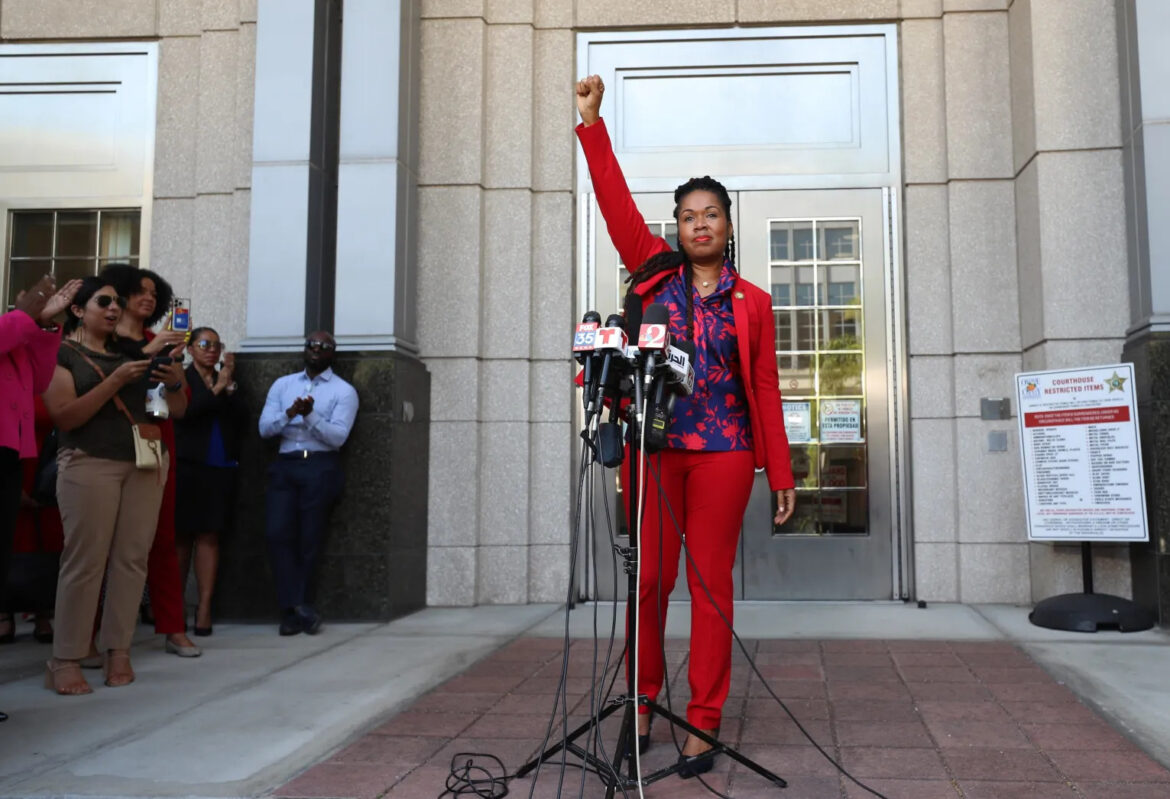Florida Governor Ron DeSantis has once again stirred controversy by suspending an elected prosecutor from office. This time, the target is State Attorney Monique Worrell, a central Florida Democrat. DeSantis argues that Worrell’s approach to prosecuting criminals is too lenient and poses a threat to public safety.
The move has drawn sharp criticism from Worrell herself and fellow Democrats, who accuse DeSantis of using this suspension to divert attention from his struggling presidential campaign. The governor’s office had been expressing dissatisfaction with Worrell’s performance for months, particularly concerning her handling of cases involving a 19-year-old who was later charged with killing three individuals, including a television reporter.
During a press conference held at the state Capitol, DeSantis cited examples of instances where he believed Worrell had failed to pursue mandatory sentences for criminals. He emphasized that prosecutors have discretion, but he claimed that Worrell had abused this discretion, effectively undermining certain laws in Florida.
Worrell, speaking to the media outside the Orange County courthouse, accused DeSantis of being a tyrant and removing her for political reasons. She referred to his actions as a smokescreen to boost his image among his base.
This suspension comes shortly after DeSantis restructured his presidential campaign team as he tries to catch up to former President Donald Trump. Worrell likened her removal to a power play following DeSantis’ campaign changes.
This isn’t the first time DeSantis has removed an elected prosecutor from office. He suspended Hillsborough prosecutor Andrew Warren previously, a move that garnered criticism from a federal judge who deemed it lacking thorough investigation.
In Worrell’s case, DeSantis’ executive order includes detailed documents and reports outlining issues within her office. He also presented summaries of criminal cases to support his claim that Worrell allowed offenders to receive reduced sentences.
Worrell dismissed these allegations as a false narrative and pointed to statistics showing a decrease in crime rates in Orange County and Orlando. She contended that her clashes with law enforcement stemmed from her prosecution of rogue police officers.
DeSantis took action just days after Worrell pushed back against a local police union’s criticisms of her handling of a case involving a man who shot two police officers. The man had been out on bond after being charged with sexual assault, a decision that Worrell argued was beyond her control.
While Florida law grants the governor the authority to suspend elected officials, critics argue that these suspensions should be reserved for those accused of criminal wrongdoing. Democrats view this as a politically motivated action, targeting a region of the state led by Democrats.
Republicans like Attorney General Ashley Moody and House Speaker Paul Renner support DeSantis’ decision, emphasizing public safety. Moody countered claims of political motivation by highlighting Worrell’s higher case dismissal rate compared to Democratic prosecutors in other counties.
In response, Worrell’s supporters, including Rep. Anna Eskamani and Rep. Maxwell Alejandro Frost, criticize DeSantis for eroding local control and democracy. They view the suspension as an unconstitutional move driven by DeSantis’ personal and political interests.
In the wake of the suspension, DeSantis appointed Andrew Bain, a circuit court judge, to fill Worrell’s position. This decision raises questions about the potential reversal of policies enacted by Worrell.
As Florida grapples with this divisive decision, the intersection of politics and justice remains a central concern. The fate of Monique Worrell, the ongoing debate surrounding prosecutorial discretion, and the implications for the democratic process will continue to shape the conversation in the state and beyond.
Photo Caption: (Ricardo Ramirez Buxeda/ Orlando Sentinel)


